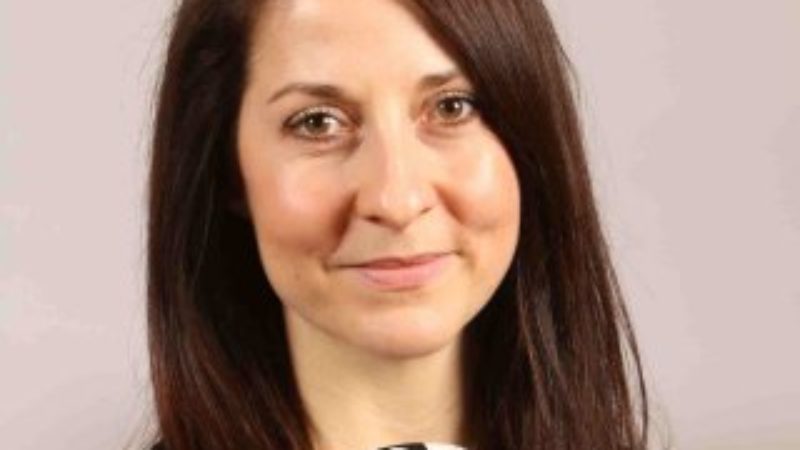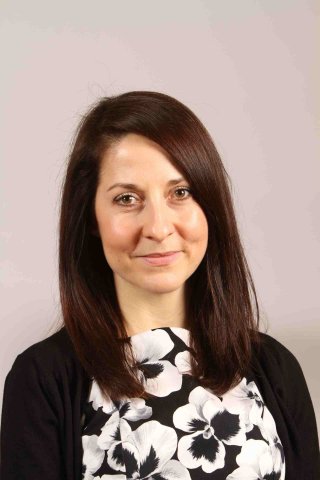
I meet Liz Kendall on the 9.30 train out of Kings Cross. I’ve had to run to get the train, desperately trying not to cover myself in coffee. I find Kendall at a table near the rear of the train, eating a yoghurt with some sort of berries. Very healthy. She asks what I had for breakfast. The logo on my coffee cup says “coffee dogs”. I had a hot dog. She isn’t impressed. She’s pretty concerned about my diet – which as a health minister (and fitness enthusiast) seems fair enough. She ran 45 minutes this morning (although she’s going to have to find another form of exercise – running is bad for her knees). I ran for the train. I’m starting to feel lazy, and it’s barely 9am.
Kendall, though, is full of beans. She’s been out on the road for the past few weeks, and comes prepared with a campaign kit. Toothbrush, change of clothes, packed lunches and – crucially for me – a phone charger. She’s a one person battlebus.
Except on a train.
Today she’s on her way to Grimsby and Lincoln. We zig zag our way across the country, via Grantham. It’s the first time either of us have been on the newly privatisated East Coast mainline. After buying a cup of tea from the trolley Kendall is handed a Virgin trains branded chocolate, which she regards suspiciously. Before changing trains at Grantham, I ask her how many visits she’s done recently. She blows out her cheeks as she recalls the last handful:
“Last week I did Brentford and Isleworth, Monday. Redcar, Thursday. I launched Nottingham’s manifesto on Friday morning, did Sherwood Friday afternoon. And then Saturday I was in Warrington South.”
That’s four to five visits a week at the moment, with more to come once Parliament finally closes. The lack of legislation – the zombie parliament – has left many MPs frustrated with having to be in Westminster. Kendall is no different, with March 26th, when she can get back to her constituency and out campaigning – a constant refrain.

Kendall would clearly rather be in Leicester than in London. She calls the town home, and describes Westminster as “deeply dysfunctional”. She’s clearly not someone who gets misty eyed about the seat of government, but she has worked there on and off for a long time. In many ways she has the now obligatory MPs CV – working for MPs including Harriet Harman (often a good career move, Ed Miliband was one of her predecessors) and as a wonk at IPPR. Yet she’s also had her fair share of ‘real world experience’ too. The job Kendall says she’s most proud of was being head of the Maternity Alliance Charity. She was also the Director of the Ambulance Service Network. Babies and ambulances – sounds pretty real to me.
One thing Kendall has in common with some other front line politicians is that she studied at Cambridge (confession – so did I), but she’s rightly unapologetic about it:
“I am incredibly proud that I managed to get to Cambridge. My dad left school at 16 and my mum went to teacher training college, she was a primary school teacher, they hadn’t been to university. I’m very proud that me and my brother went to a great university. My dad worked his way up through his job and my mum always taught us that you should try and do the best that you can and that education was incredibly important.
So, I had a good start, I had a great start in life, I went to a good school and I had parents who really supported me, but I came from a sort of ordinary middle class background just outside of Watford and a good education was my ticket to a better life. That’s why I am most passionate about that actually; that getting a great education is so important to opening not just doors, but opening your eyes and your mind – giving you the chances and choices to get on with your life. And that’s the thing I’m most passionate about.”
Family is clearly incredibly important to Kendall, she says:
“they completely shaped who I am and what I do, and I still learn a lot from my family, and family life changes as you get older. My family helps me understand other peoples’ lives as well.”
Her family don’t live in Leicester but she makes time to see them as often as she can and she confides that she always wants to be a better auntie. We share stories about our respective neices:
You’ve got to sort of stay as relatively normal as you can, and you only do that by doing things that everybody else does which is being with family and friends.
She admits that work/life balance isn’t easy. A life divided between different places, different groups of friends and different priorities. It’s the part of the political life that people don’t often talk about, but the stresses, compromises and difficulties are at least as acute as those that happen in SW1. Her dad sound like he had to make similar compromises of his own:
“I grew up in my family where I never, God bless him, I never saw my Dad. He was out of the house in the morning before we got up because he commuted. He got back late at night when we’d gone to bed. It was all about work, it was about family and it was about community.”
We arrive in Lincoln and we’re greeted by Labour candidate Lucy Rigby at the train station. Rigby fills us in on the local issues as she takes Kendall to canvass near the city centre. We’re not in Lincoln for long, but she wants to know how she can help – on health policy, any advice she can give – and then she’s bounding off onto the doorstep. She’s a self-confessed campaigning fan. Sure, it’s not everyone’s idea of fun – but her enthusiasm is infectious:
I don’t care, I love people, I love meeting people and I need Lucy Rigby to win my constituency, which is my, if I’m going to do my job properly, I need Lucy, I need Labour. I need those candidates to win.
As we walk back towards Lincoln station, I ask Kendall about the work/life balance of being an MP again. She says she does a pub quiz in Leicester on a Sunday night. I forgot to ask if she had a funny team name, which is a shame. Kendall’s Mint Cakes perhaps?
Back on the train then, and onwards to Grimsby, where Kendall has arranged to host a “Care Summit” with the local PPC Melanie Onn. She listens intently as carers tell their stories. Of success and failure. Of struggle and achievement. But I want to probe her more on how she thinks health and social care services should be provided in future. A recent interview with House Magazine saw her suggest that the private sector has a delivery role. This was spun – perhaps unfairly – as a disagreement with Shadow Health Secretary Andy Burnham. As I probe Kendall on this, it doesn’t seem like there’s actually a real difference of opinion at all:
“I think the bulk of health and care services will be delivered by the public sector and those services need to change, to improve, to help people stay living healthy and well at home. I think that there is an important role particularly for the voluntary sector. We’re seeing people like Macmillan Cancer doing very important work around the end of life. I do believe that what matters is what works. You’d think it was a bit peculiar if politicians wanted policies that didn’t work.
What I did say was that I was very supportive of what the last Labour Government did to improve the NHS. The private sector had a role in that, but I really believe that the real way we’re going to be changing services in future is not about contracting out lots of different individual services. That’s not the way that we’re going to change services in future. It’s going to be about looking at how you join up existing NHS and social care services, shift the focus out of hospitals in to the community and more towards prevention.
And that is the big reform agenda. The big reform agenda.”
For many in the Labour Party though, the words “reform agenda” has come to mean privatisation, and anyone who talks about reforming public services has been given the “Blairite” label. Liz Kendall certainly has. In previous weeks she has been called a Blairite more often than Blair himself, and not without reason. She’s a Vice-Chair of Progress (as was Ed Miliband) and has written pamphlets fellow Progress Vice-Chair Steve Reed and Chair John Woodcock.
She’s clearly frustrated with the simplistic labelling, which she says is “completely out of date”. The problem, of course, is that the press have no other labels to go on – but Kendall alludes to the divide in the party now being over where power lies:
“I’ve been able to do some work with Compass actually on reforming the state and giving away power and control.
“I think the real challenge is how you take power and control out of Westminster and Whitehall and push it down to individuals and communities. And I believe that the new model of public services and communities is about how you share power. How you share power and how you help individuals, families, communities take on more of a role.
“I am pro-reform of public services and pro-change – changing those public services – but I don’t necessarily see that as a left/right divide, because you’ve got a lot of people who are seen more traditionally on the left, like Compass, who are arguing for change in public services and sharing power.”
All of this stuff about power – tackling inequalities of power – sounds a bit Jon Cruddas. Perhaps even a bit “Blue Labour”. Kendall says she doesn’t define herself as blue, but throughout the day there are these refrains – family, community, work, power – that sound more like a Cruddas or a Glasman than a Blair or a Mandelson. I suspect she’s blue-er than she’s letting on.
I’m impressed by Kendall over the course of the day we spend together. She’s friendly but focussed. Thoughtful and well informed. Open to new ideas and willing to listen to and engage with criticism. She’s got a steely side to her character, but without being an inflexible and terrible person (which, lets be honest, is often what calling a politician ‘steely’ really means).
I’m not surprised that Kendall has been talked of as a potential future party leader. I was sceptical before the interview. I had only a two-dimensional view of her, I think. A former spad, rising quickly through the ranks of the PLP. A polished performer. But she’s more interesting than that. And so I ask the question. The question I have to ask.
Would Liz Kendall like, perhaps, one day, to be the leader of the Labour Party?.
“No, I want Ed Miliband to be the next Labour Prime Minister.”
And people say you never get a straight answer from a politician.




More from LabourList
Majority of Labour members oppose government’s anti-migration measures
‘First past the post is corroding trust in politics. The government must make all elections fit for the future’
‘Hope starts young: Why Labour must tell the story of a better tomorrow’